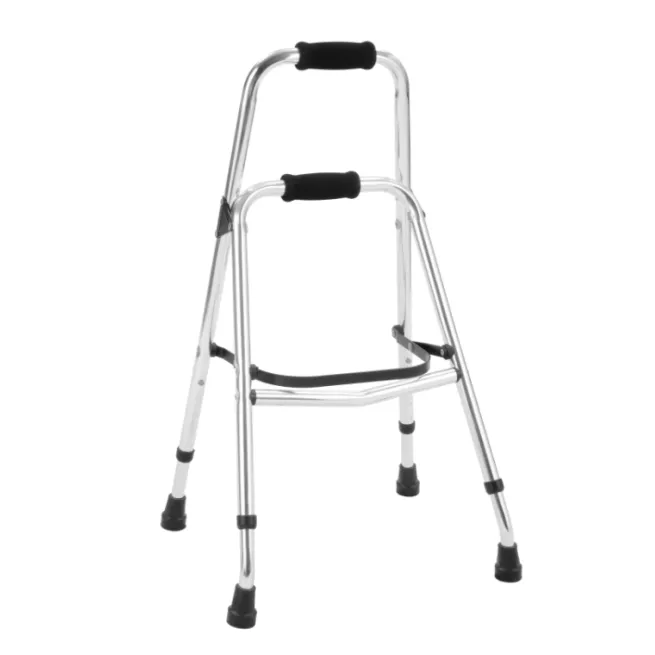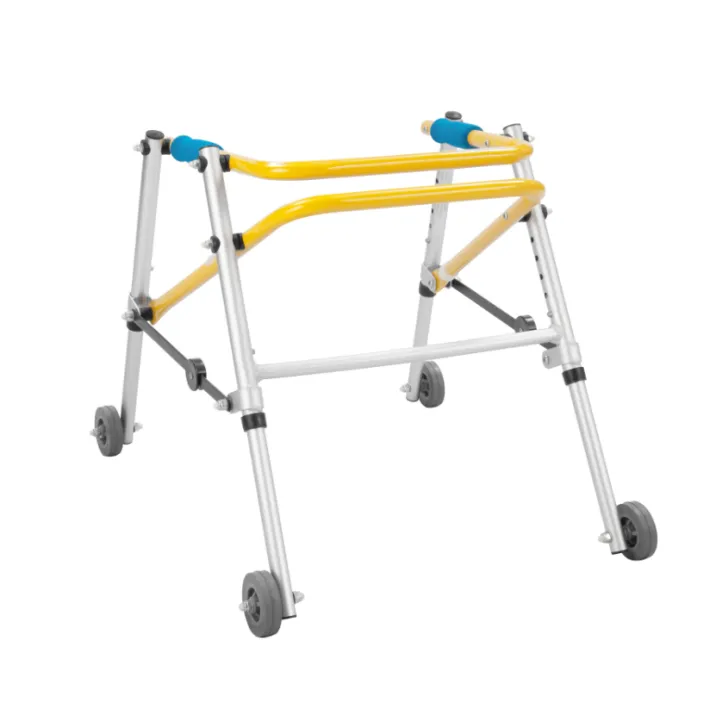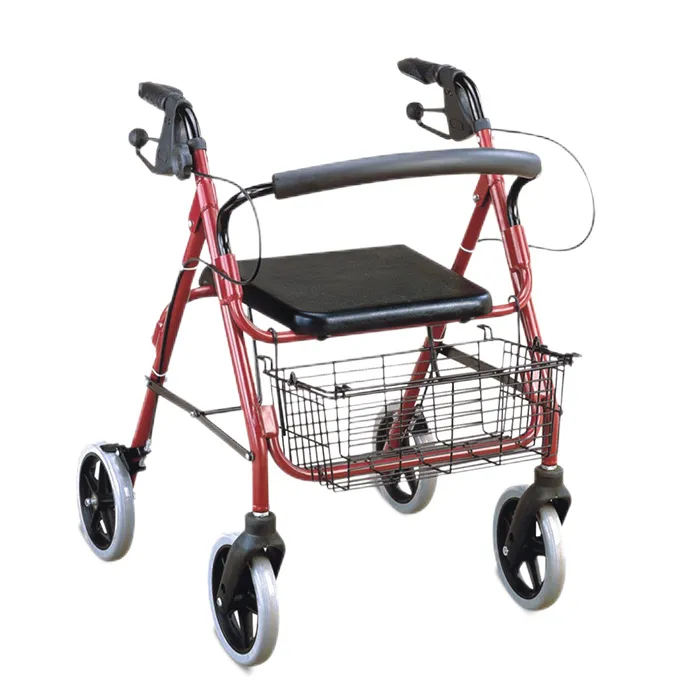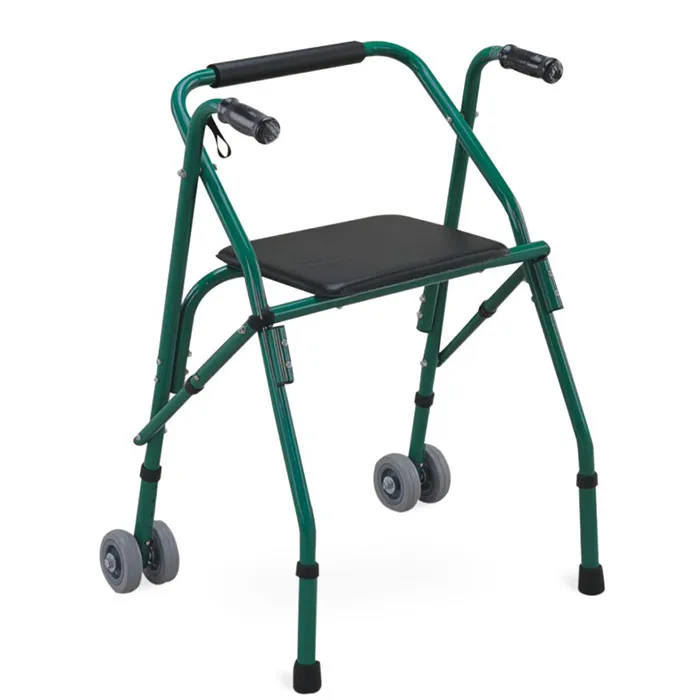As an important mobility aid, light weight rollator is widely used by people with limited mobility. But specifically, in what situations do you need to use a light weight rollator? Focusing on this issue, this article will conduct a detailed and professional discussion on the definition of light weight rollator walker, applicable population, specific usage scenarios, selection criteria, and precautions, and comprehensively answer the core question of "in what situations do you need to use a light weight stand up rollator".

What is a light weight rollator walker?
A light weight rollator is a device that assists walking. The light weight stand up rollator is mainly composed of a frame, a handle, wheels (partially wheelless design), a brake system, etc., and is designed to provide stable support for people with limited mobility, helping them maintain balance while walking and reduce the risk of falling.
Light weight rollator can be roughly divided into the following categories according to different structures and uses:
● Standard rollator: wheelless or with small wheel design, mainly used indoors;
● Wheeled rollator: equipped with front wheel or full wheel, suitable for outdoor use, easier walking;
● Folding rollator: easy to store and carry, suitable for traveling;
● Rollator with seat: you can sit down and rest when you are tired of walking;
● Electric rollator: it is suitable for people with extremely limited physical strength to assist walking with electricity.
Different types of light weight rollator meet different degrees and needs of mobility assistance.

Who is the light weight rollator suitable for?
Knowing which groups of people need to use light weight rollator walker is the basis for answering "what situations need to use light weight rollators". Light stand up rollator is mainly suitable for these groups: the elderly, postoperative rehabilitation patients, patients with neurological diseases, patients with musculoskeletal system diseases, disabled people, and people with long-term physical decline.
1. Elderly
With age, the muscle strength, joint flexibility, and balance ability of the elderly gradually decline, which makes them prone to instability and fall risks when walking.
Light weight stand up rollatorcan provide stable support for the elderly, enhance self-confidence and prolong independent living time.
2. Postoperative rehabilitation patients
Patients who have undergone various orthopedic surgeries (such as hip replacement, knee replacement) or neurological surgeries need to use light weight rollator walker to help restore walking ability in the early stage of rehabilitation.
3. Patients with neurological diseases
For example, patients with Parkinson's disease, sequelae of stroke (cerebral infarction), spinal cord injury, etc.
Light stand up rollator can help them improve gait abnormalities and reduce the risk of falling.
4. Patients with musculoskeletal system diseases
Patients with osteoporosis, arthritis, severe muscle atrophy and other diseases often have difficulty walking due to pain or lack of strength, and need to use light weight rollator to assist in movement.
5. People with disabilities
Groups with partial limb disabilities and lower limb dysfunction need to use light stand up rollator to obtain basic walking support.
6. People with long-term physical decline
Due to the decline in physical fitness caused by long-term bed rest or lack of exercise, light stand up rollator can be used as an auxiliary tool to re-establish walking ability.

In what specific situations do you need to use a light stand up rollator?
Situations where a light weight rollator is needed:
1. When walking unsteadily or falling frequently
2. When standing and walking endurance decreases
3. When the upper and lower limbs are weak
4. When the sense of balance decreases
5. During rehabilitation training
6. When you need extra support when traveling or shopping
In addition to dividing according to the population, you can also analyze which specific situations require the use of a light weight rollator walker from the actual application scenario. The following is a detailed description:
1. When walking unsteadily or falling frequently
When an individual shows unstable walking, slow steps, short standing time, and easy falling in daily activities, a light weight stand up rollator should be considered. The light weight rollator can provide external support, stabilize the body's center of gravity, thereby reducing the risk of falling and protecting the user's safety.
2. When standing and walking endurance decreases
If the user feels obvious fatigue after standing or walking for a short time, or needs to rest frequently, a light stand up rollator (especially a style with a seat) allows the user to stop and rest at any time to avoid health problems caused by excessive fatigue.
3. When the upper and lower limbs are weak
When the upper and lower limbs are weak and unable to support the body to walk independently, the light weight rollator walker can effectively share part of the body weight load, making walking possible and safer.
4. When the sense of balance is impaired
With neurological diseases or natural aging, the vestibular function, vision, touch and other sensory systems of individuals weaken, resulting in a decrease in balance ability. As an auxiliary tool, the light weight stand up rollator can effectively improve the balance when walking.
5. During rehabilitation training
During various postoperative rehabilitation processes, the light weight stand up rollator can be used as an important device for progressive rehabilitation training. The use of a light weight rollator can help patients gradually restore their ability to walk while reducing their dependence on caregivers.
6. When additional support is needed when traveling or shopping
Even if you can move around at home, when you are outdoors for a long time (such as shopping and traveling), the physical load increases. The use of a light weight stand up rollator can greatly increase the duration and range of activities and improve the quality of life.
Application of different light weight rollator walker types in different usage situations
For different usage situations, it is crucial to choose the right type of light weight rollator:
| Usage | Recommended light weight rollator types | Description |
| Indoor short-distance walking | Wheelless rollator | High stability, suitable for flat ground |
| Outdoor long-distance walking | Four-wheel rollator with brakes | Good flexibility, equipped with a brake system, suitable for uneven ground |
| Frequent need for rest | Rollator with seat | You can stop and rest at any time to reduce physical burden |
| Lack of strength in the early stage of recovery | Wide frame rollator | Strong support, suitable for use in the strength recovery phase |
| Lightweight travel needs | Folding light rollator | Light weight, easy to store and carry |
Reasonable selection of light weight stand up rollator type can further ensure the safety and comfort of users.
What are the common misunderstandings in the use of light weight rollator?
There are some common misunderstandings in the use of light weight rollator walker, and users need to be vigilant to avoid:
Misunderstanding 1: Eager to use light weight rollator when you feel slightly unwell
The light weight stand up rollator is an auxiliary tool. If you rely on it too early, it may cause muscle degeneration. You should decide whether to use it based on professional evaluation.
Misunderstanding 2: One type of light weight rollator is suitable for all occasions
There are many types of light weight rollator walker. You should choose the corresponding model according to the specific occasion. Don't use it blindly.
Misunderstanding 3: Not adjusting the height of light weight rollator
Failure to adjust the height of light stand up rollator according to personal height may lead to incorrect posture during use and cause muscle strain.
Misunderstanding 4: Ignoring the maintenance of light weight rollator
As a common equipment, light weight rollator walker needs regular maintenance, otherwise it is easy to have mechanical failure.

What products does Yikang Medical offer for hospital and rehabilitation use?
Foshan Yikang Medical Technology Co., Ltd is a professional China-based manufacturer and supplier of hospital furniture and rehabilitation equipment. We offer a wide range of high quality, low price products including hospital beds, nursing beds, wheelchairs, commode chairs, shower chairs, stand up rollators, canes, and other mobility aids. Our factory-direct sales model ensures cheap prices and reliable quality, making us a trusted OEM supplier for many well-known brands. Whether you are looking for customized hospital furniture or planning to buy in bulk at wholesale prices, we provide flexible solutions to meet your purchasing needs.

